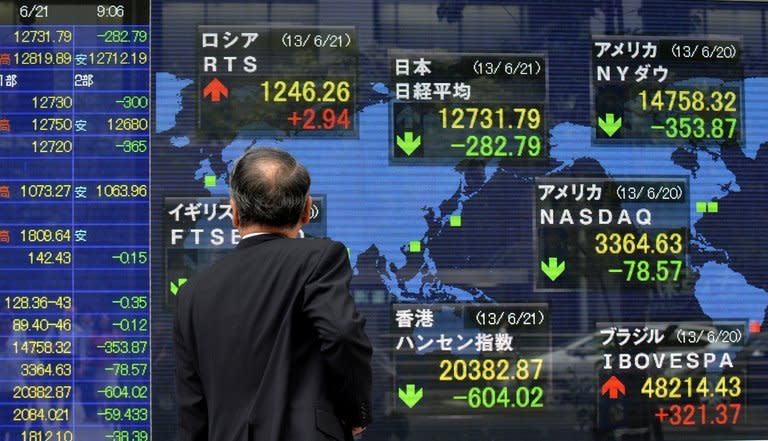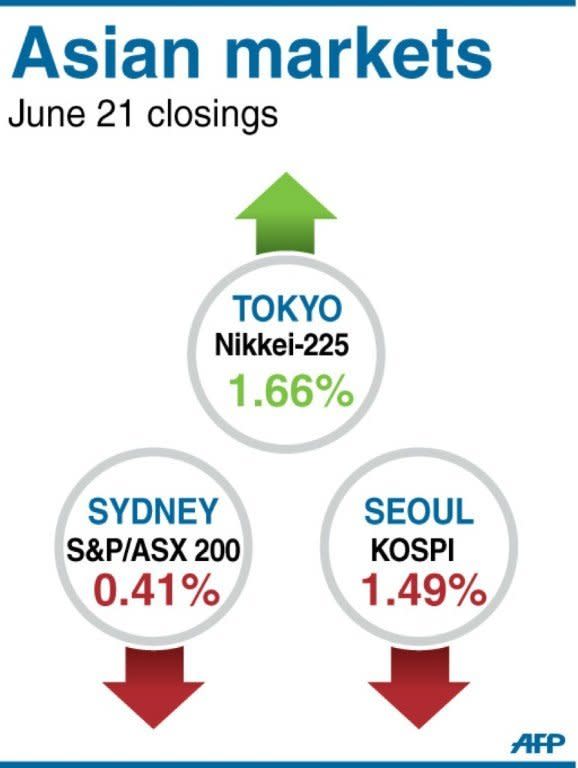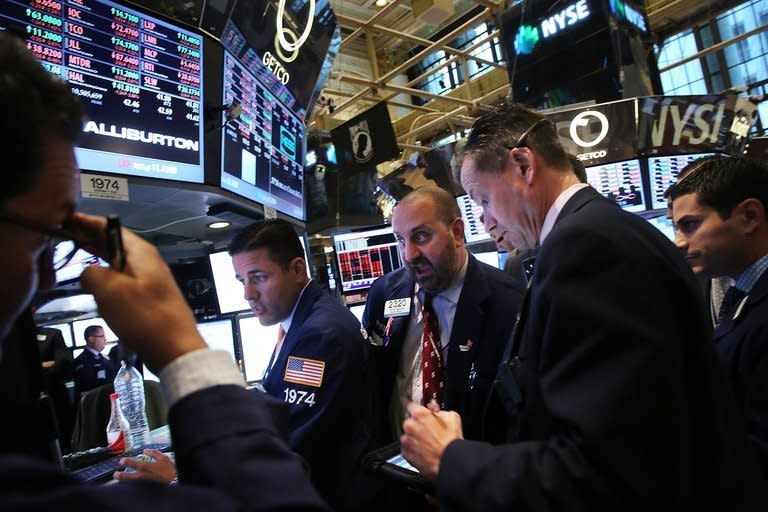Asian markets mostly fall on Fed fears, dollar surges
Asian markets mostly fell further Friday, extending a sell-off in line with steep losses on Wall Street after the US Federal Reserve signalled a possible end to its multi-billion-dollar stimulus programme. However, early losses in Tokyo were reversed thanks to a surging dollar, which began heading back towards the 100 yen level. The losses are part of a global correction in equities and commodities, which have enjoyed strong rallies since the Fed unveiled its bond-buying scheme, called quantitative easing (QE), in September. Tokyo began the day two percent lower, adding to a slump on Thursday, but it reversed course in the afternoon thanks to the dollar rally and closed 1.66 percent higher, adding 215.55 points to 13,230.13. Sydney fell 0.41 percent, or 19.6 points, to 4,738.8, while Seoul tumbled 1.49 percent, or 27.66 points, to 1,822.83. Hong Kong lost 0.59 percent, or 119.56 points, to end at 20,263.31 and Shanghai was off 0.52 percent, or 10.93 points, at 2,073.09. Both markets pared earlier losses after reports that the country's central bank had pumped billions of dollars into several lenders to ease a liquidity crisis. Markets have been in turmoil since last month as talk mounted that the Fed would pull the plug on its $85-billion-a-month QE, which was put in place to help kick-start the US economy. A series of upbeat US indicators added to those concerns and Fed chief Ben Bernanke confirmed dealers' fears Wednesday when he said the central bank would begin to limit the spending this year if the economy continues to pick up. He also suggested the whole scheme could be wound up by mid-2014. Michael Hewson, senior market analyst at CMC Markets UK, called the markets' reaction "a classic case of perverse logic", given that Bernanke was clearly signalling stronger US growth. On Wall Street, the Dow sank 2.3 percent, or 354 points, its largest points loss since November 2011, while the S&P 500 lost 2.5 percent and the Nasdaq tumbled 2.3 percent. The markets had lost around one percent on Wednesday soon after Bernanke's announcement. "US shares had been advancing for so long -- almost without a serious pullback -- that it was almost about time we finally saw one," Kenichi Hirano, market adviser at Tachibana Securities in Tokyo, told Dow Jones Newswires. Markets in emerging economies were also badly hit as traders who had ploughed in cash looking for better returns retreated to the safety of the United States. Manila, which had struck record highs on several occasions this year, fell 2.28 percent, or 144.50 points, to 6,182.17, while in late trade Jakarta was down 1.77 percent. However, the greenback rallied on expectations that fewer dollars will be sloshing around financial markets if the Fed rolls back QE. It bought 97.90 yen Friday, compared with 97.27 yen in New York late Thursday. It was also well up from the 95.50 yen in Tokyo Wednesday before the Fed decision. The euro traded at $1.3222 in Asia from $1.3223, and 129.39 yen compared with 128.83 yen. Gold prices have lost around seven percent since Bernanke's announcement as the stronger dollar makes the precious metal less attractive. Bullion fetched $1,293.33 per ounce by 1137 GMT, from $1,303.35 late Thursday. Fresh evidence of a slowdown in China added to risk-aversion, with a closely watched manufacturing survey showing slower activity in June. On oil markets New York's main contract, West Texas Intermediate (WTI) light sweet crude for delivery in August, was flat at $95.40 a barrel and Brent North Sea crude for August delivery gained 49 cents to $102.64. WTI lost $2.84 in late New York trade Thursday, and the Brent dropped $3.97, its biggest loss since November 7. In other markets: -- Taipei fell 1.34 percent, or 105.60 points, to 7,793.31. Hon Hai fell 0.99 percent to Tw$70.0 while Taiwan Semiconductor Manufacturing Company was 0.48 percent lower at Tw$103.5. -- Wellington shed 0.81 percent, or 35.45 points, to close at 4,363.07. Clothing retailer Pumpkin Patch shed 4.0 percent to NZ$0.95, while outdoor apparel firm Kathmandu lost 2.4 percent at NZ$2.48. -- Bangkok fell 0.12 percent, or 1.69 points, to 1,400.50. Oil company Bangchak Petroleum added 8.73 percent to 34.25 baht, while electricity firm Glow Energy jumped 13.91 percent to 75.75 baht. -- Kuala Lumpur eased 0.37 percent, or 6.49 points, to 1,755.85. British American Tobacco ended down 2.6 percent at 59.50 ringgit while Felda Global Ventures gained 3.8 percent to 4.68 ringgit. -- Jakarta ended down 2.48 percent, or 114.62 points, at 4,515.37. State-controlled miner Aneka Tambang fell 8.49 percent to 970 rupiah, and Asia Pacific Fibers slid 7.33 percent to 139 rupiah. -- Singapore was down 0.28 percent, or 8.81 points, to 3,124.45. Singapore Airlines was down 0.50 percent to Sg$10.00 while United Overseas Bank gained 0.15 percent at Sg$19.80. -- Mumbai rose 0.29 percent, or 54.95 points, at 18,774.24. India's state-run oil explorer ONGC climbed 2.56 percent to 308.0 rupees and IT outsourcer Infosys rose 2.21 percent to 2,419.15 rupees.




